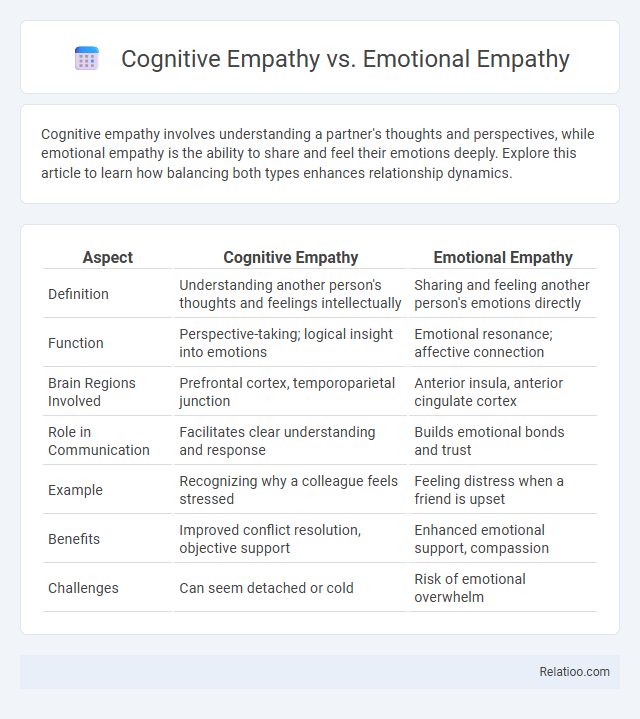Cognitive empathy involves understanding a partner's thoughts and perspectives, while emotional empathy is the ability to share and feel their emotions deeply. Explore this article to learn how balancing both types enhances relationship dynamics.
Table of Comparison
| Aspect | Cognitive Empathy | Emotional Empathy |
|---|---|---|
| Definition | Understanding another person's thoughts and feelings intellectually | Sharing and feeling another person's emotions directly |
| Function | Perspective-taking; logical insight into emotions | Emotional resonance; affective connection |
| Brain Regions Involved | Prefrontal cortex, temporoparietal junction | Anterior insula, anterior cingulate cortex |
| Role in Communication | Facilitates clear understanding and response | Builds emotional bonds and trust |
| Example | Recognizing why a colleague feels stressed | Feeling distress when a friend is upset |
| Benefits | Improved conflict resolution, objective support | Enhanced emotional support, compassion |
| Challenges | Can seem detached or cold | Risk of emotional overwhelm |
Understanding Empathy: A Dual Perspective
Cognitive empathy involves the ability to understand another person's perspective and thoughts, while emotional empathy refers to sharing and feeling the emotions experienced by others. Empathy, in general, encompasses both these dimensions, allowing you to connect deeply by recognizing and resonating with feelings and mental states. Understanding empathy from this dual perspective enhances interpersonal communication and emotional intelligence.
Defining Cognitive Empathy
Cognitive empathy involves the ability to intellectually understand another person's perspective or mental state without necessarily sharing their emotions. It differs from emotional empathy, which is the capacity to physically or emotionally feel what another person is experiencing. Empathy, as a broader concept, encompasses both cognitive empathy and emotional empathy, enabling individuals to connect and respond appropriately to others' feelings and thoughts.
What Is Emotional Empathy?
Emotional empathy, also known as affective empathy, involves directly feeling another person's emotions as if they were your own, enabling a deep emotional connection. This form of empathy activates brain regions associated with emotional processing, such as the mirror neuron system and the anterior insula, allowing individuals to experience shared feelings like pain or joy. Unlike cognitive empathy, which focuses on understanding another's perspective without necessarily sharing their emotions, emotional empathy fosters an immediate, visceral response to someone else's emotional state.
Key Differences Between Cognitive and Emotional Empathy
Cognitive empathy involves understanding another person's perspective and mental state without necessarily sharing their emotions, while emotional empathy refers to physically feeling what another person feels, often leading to an emotional response. The key difference lies in cognitive empathy's emphasis on intellectual comprehension, enabling you to predict and interpret others' feelings, whereas emotional empathy is about mirroring emotions. Recognizing these distinctions can enhance your interpersonal skills by tailoring responses based on whether understanding or emotional connection is needed.
How Cognitive Empathy Influences Behavior
Cognitive empathy involves understanding another person's perspective and emotions without necessarily sharing their feelings, enabling more effective communication and conflict resolution. This form of empathy influences behavior by promoting rational decision-making and reducing impulsive reactions, as individuals can anticipate others' responses and adjust their actions accordingly. Unlike emotional empathy, which triggers shared emotional experiences, cognitive empathy supports goal-oriented social interactions and fosters collaboration in professional and personal contexts.
The Impact of Emotional Empathy on Relationships
Emotional empathy, the ability to deeply feel and share another person's emotions, significantly strengthens interpersonal relationships by fostering trust and emotional connection. Your capacity to experience emotional empathy enhances communication and conflict resolution, promoting a supportive and understanding bond. Unlike cognitive empathy, which involves understanding others' feelings intellectually, emotional empathy creates a profound, heartfelt connection that drives compassion and emotional responsiveness.
Benefits and Challenges of Cognitive Empathy
Cognitive empathy involves understanding another person's perspective and mental state, enabling clearer communication and conflict resolution, which benefits leadership and teamwork by fostering rational problem-solving and reducing emotional bias. Challenges of cognitive empathy include the potential for emotional detachment and misunderstanding the underlying feelings even when intentions are understood, which may hinder authentic connection. Unlike emotional empathy, which deeply feels others' emotions, cognitive empathy prioritizes intellectual understanding, offering strategic advantages but requiring careful balance to maintain emotional sensitivity.
Strengths and Limitations of Emotional Empathy
Emotional empathy allows individuals to deeply experience and share the feelings of others, enhancing emotional connections and social bonding, but it can lead to emotional overwhelm and personal distress. Its strength lies in fostering compassion and support through genuine feeling, whereas its limitation includes difficulty in maintaining objectivity and potential burnout in high-stress situations. Unlike cognitive empathy, which involves understanding another's perspective intellectually, emotional empathy triggers a visceral emotional response that may hinder balanced decision-making.
Developing Both Types of Empathy in Daily Life
Developing cognitive empathy involves actively understanding another person's perspective and thought processes, enhancing communication and conflict resolution skills. Emotional empathy requires tuning into others' feelings, fostering compassion and supportive relationships through genuine emotional connection. Practicing mindfulness, active listening, and engaging in diverse social interactions cultivates both cognitive and emotional empathy, promoting balanced emotional intelligence and deeper interpersonal bonds.
Cognitive Empathy vs Emotional Empathy: Which Matters More?
Cognitive empathy involves understanding another person's perspective and mental state, while emotional empathy is the ability to share and feel their emotions. Your ability to balance cognitive empathy with emotional empathy enhances social interactions and emotional intelligence effectively. Research shows cognitive empathy often plays a more critical role in decision-making and conflict resolution, whereas emotional empathy strengthens interpersonal bonds.

Infographic: Cognitive Empathy vs Emotional Empathy
 relatioo.com
relatioo.com